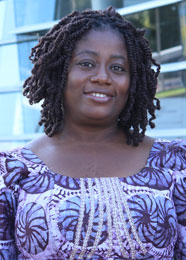 PhD candidate
PhD candidate
Tel +64 3 364 3646
Email chidimma.aham-chiabuotu@postgrad.otago.ac.nz
PhD Topic
Exploring internally displaced women's experiences and their resources for prevention and response to sexual violence in northern Nigeria.
Supervisors: Associate Professor Gillian Abel and Dr Lee Thompson
Background
Chidimma started her carrier as a Nurse/midwife in Nigeria where she was constantly confronted by maternal and child death, infectious diseases and diverse chronic diseases, which could be significantly prevented if poverty, illiteracy and social injustice are eliminated at all levels.
Hence she got involved with more population-oriented health programs and eventually pursued a first degree in Public Health, followed by a master of Public Health degree.
She is a faculty member of the Department of Public health, Babcock University, Nigeria, where she has taught introduction to public health and health promotion, environmental health, occupational health, health sociology and health systems management.
Her professional and research interests are on women and adolescents' sexual and reproductive health issues, gender-based violence; social determinants of health; inter-disciplinary relationships in health care and Seventh-day Adventist health principles.
Research Objectives
Her research in context is the massive displacement of persons, mostly women and children, as a result of the Boko Haram insurgency, counterterrorism efforts by the Nigeria military, and several attacks by Fulani Herdsmen in Northern Nigeria. Till date, very little is known about the lived experiences of the internally displaced women in Nigeria.
Hence, her study seeks to gain understanding of the internally displaced women's experiences, while exploring for possible sexual violence experiences, the meanings they make of these experiences and their resources for the prevention of, and response to sexual violence.
The study will uncover socio-cultural contexts that underpin women's understandings and interpretations of their experiences in Nigeria.
Findings of this study will:
- Draw both national and international attention to the strengths and vulnerabilities of the displaced women in Nigeria
- Inform policies for addressing problems of displaced persons
- Highlight socio-cultural and structural factors that impact the lives and experiences of Nigerian women in general
- Contribute towards a theoretical understanding of displaced women's experiences and their interpretations
Publications
- Chidimma B. Aham-Chiabuotu , RN/MPH & Godwin N. Aja , DrPH (2017)
- “There is no moral they can teach us”: Adolescents' Perspectives on School-Based Sexuality Education in a Semiurban, Southwestern District in Nigeria”. American Journal Of Sexuality Education Vol. 0 , Iss. 0,0 Pages 1-22 | Published online: 02 Mar 2017
- Augusta. Y. Olaore,. Vickie. Ogunlade,. And Chidimma Aham-Chiabuotu in Julie L. Drolet [eds] (2016)
- “Child-sensitive social protection initiatives in Nigeria: A role for indigenous social care.
- Augusta Y. Olaore & Chidimma Aham-Chiabuotu (2013)
- “Teaching the Strengths-Based Approach to Prospective Faith-Based Social Care Volunteers: A Botswana Church Camp Experience” Social Work & Christianity, Volume 40 (1): p. 105
- Augusta Y. Olaore & Chidinma Aham-Chiabotu (2012)
- “University And Family Collaboration In Substance Abuse Intervention In Nigeria: A Private University Case Study”. African Journal of Drug & Alcohol Studies, 11(1), 2012
Books
- Luke Onuoha, Godwin Aja, Chidimma Aham-Chiabuotu (2015) “Value added living”
- Godwin Aja, Chidimma Aham-Chiabuotu, Lolade Ogunsanmi, Makinwa Solademi (2014)
- “ABC of Women's Health”
- Godspower and Chidimma Chiabuotu “Financing Higher Education without Tears- A practical tool for Parents and Students”
Poster Presentation
- Chidimma B. Aham-chiabuotu and Godwin. N. Aja (2014)“In-School Adolescents' Sexual and Reproductive Health Education Experiences, Needs and Preferences in Ikenne Local Government- Nigeria: The Implications for Health Education Training”
